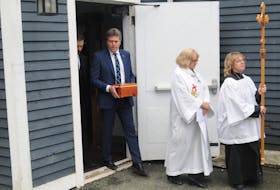
Tameron Rose would have started kindergarten two weeks from now.
Instead, his mother, Maria Rose, and grandmother, Evelyn Rose, are left to spend the rest of their time wondering what kind of person their little man would have grown up to be.
The fact they are left with just a handful of photographs and 51 weeks of memories formed the basis of their victim impact statements read out in the Supreme Court of Newfoundland and Labrador in Corner Brook Tuesday morning.
The impact statements were part of the sentencing hearing for Jeffery Isaac Percy Tippett, the 36-year-old man convicted of manslaughter in July for the death of the 11-month-old boy who was in Tippett’s care on Jan. 30, 2007.
Maria Rose was not in court, but her brief statement was read into the record by Crown attorney Douglas Howell, who asked Justice Alan Seaborn to sentence Tippett to between five and seven years.
Evelyn Rose was there. She took the witness stand and told the court about the “empty legacy ... that will never be filled” in their lives without Tameron, whom she described as her reason for getting up in the morning.
“They say forgiveness is good for the soul,” she began. “I guess my soul will be in pain for a long time because forgiveness is not there.”
Maintaining her composure throughout her eloquent, emotional reflection on the past four years and the years still to come, the grandmother talked about all the things she had planned to do with her grandson. She talked about how the family will never get to see important milestones like his kindergarten graduation, his junior high school prom, his high school graduation.
“There will be no bragging or pride of his first steps, his first complete sentence, no pictures or souvenirs of Tameron’s first haircut,” she said, adding that the snippet of hair cut by nurses at the Janeway Children’s Hospital and tied up in blue ribbon is not what they had envisioned.
She recounted the glee in Tameron’s face in the photos they have of his first and only Christmas and pondered how she will revisit his loss every time she sees pictures of her siblings’ growing grandchildren and other children squealing with delight at the discovery of the Easter Bunny and Santa Claus.
“But you can’t hold memories in your arms, or feel his little arms around your neck as he cuddles into you,” she said. “Memories can’t give kisses and hugs.”
In her statement, Maria Rose said the hole Tameron’s loss left in her life has only become bigger and more painful with the passage of time.
“I still grieve for the life that my son should have had and the loss of the love and light he brought into my life,” she wrote.
When it came time for Howell to make his submission on an appropriate sentence, he said this was more of an unlawful act of manslaughter than it was manslaughter resulting from criminal negligence when considering the spectrum of moral culpability. Howell emphasized that, as testified to by medical experts during Tippett’s trial, the fractured skull and subsequent brain injury suffered by Tameron were the result of a significant blow to the back of the head.
Howell also argued that the death of a child caused by an unrelated caregiver is “equally repugnant” as such a death caused by the child’s own parent.
Citing the degree of force that had to have been used and the breach of trust involved, Howell also requested that Seaborn make an order that Tippett would have to serve at least half of his sentence before being eligible to apply for parole. Normally, an incarcerated person can apply for parole after serving one-third of the sentence.
Defence lawyer Keir O’Flaherty disagreed with the Crown on both the length of the prison term and the request for the judge to use his discretionary power to delay Tippett’s parole eligibility.
O’Flaherty argued the range of sentence in this case is between two and five years, preferably in the two- to three-year range. O’Flaherty said there has never been any evidence presented as to what actually happened to Tameron Rose on Jan. 30, 2007.
Either way, the defence lawyer contended, the degree of force was not analogous to the degree of force as documented in other manslaughter convictions involving the death of a child.
He also argued that a parent who kills their own child is the one who should expect a less lenient sentence.
O’Flaherty said Tippett’s parole eligibility should not be delayed because this is not a case that falls into the category of being extraordinary when compared to the case law presented to the court. Further, as opposed to much of the case law presented to the court in this matter, O’Flaherty said there was no evidence that Tippett was likely to be a repeat violent offender.
Howell and O’Flaherty did agree on the issue of Tippett receiving a two-for-one credit for time served in relation to this offence. An amendment to Canadian law that makes it more of an exception to receive such credit was not enacted until after Tippett was charged in 2007.
Up until Tuesday, Tippett had spent a total of 127 days in custody. That includes being custody after his arrest from Feb. 1, 2007 to April 21, 2007, when he was granted bail and since his conviction for manslaughter on July 8, 2011 up to Tuesday.
Tippett, who plans to move back to his native Ontario after he serves his sentence, has actually been in custody since October 2009, when he was arrested for charges alleging he deliberately caused delays in his prosecution. He was denied bail on those five charges, which will be called in court in September, and cannot receive any credit for that time served when he is sentenced for manslaughter.
Tippett will continue to accumulate an extra day for each day he serves while waiting for Seaborn to make a decision on the manslaughter sentence.
Seaborn will render his decision on sentencing Sept. 14.
The Western Star








